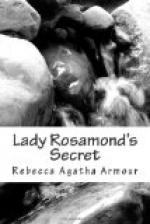others were more steady in the bent of their direction.
More definite description might be given of these parties
than that pictured here. More details might be
given of scenes of dissipation, when each member must
“drink himself under the table,” to achieve
the respect of his fellows; but the writer forbears
not wishing to expose the darker shades of the picture,
allowing the reader full control of his or her imagination,
if willing to go further. Suffice it to say, no
brawls had marred the “jolly time.”
All went away in good humour, while the American was
so loud in praise, that he almost wished himself an
officer in H. M. 52nd Regiment. Having made his
adieu, Captain Douglas took leave for his bachelor’s
quarters, held in the house on the site at present
occupied by George Minchin, Esq., on King Street, whither
his friend Howe had preceded him. In this building,
was kept the Governor’s Office, as well.
Here Captain Douglas found himself, as the darkest
hour that precedes the dawn reminded of approaching
day. “Howe,” said he, “sit
down and have a chat for a few moments. What did
you think of the affair? Of cousin Jonathan and
his nephew?” “One question at a time,
Douglas,” said Mr. Howe, pulling out a cigar
case and passing one to his friend. “In
answer to your first, I may say that under the circumstances
there was some credit for being merry. It happened
at a deuced bad time, but Sir Thomas took his defeat
manfully, while those animated volcanoes, Hawley and
Markham were wonderfully passive—a fact
we must attribute to Major McNair. The general
melee and pow-wow in which I was so unceremoniously
toasted, taught a lesson. Jove, the Major is
entitled to an order if he can, by any means, reclaim
any of the 52nd. But the most amusing of the
crowd is Trevelyan, who reminds me of an Englishman
in Paris. He is clear, too. The oftener I
see him the more I find to admire. He has a stock
of drollery in reserve, too. Only think of the
song and how received; Jove, he can sing like a thrush
or nightingale.”
“Sometimes he wears a puzzled look which I cannot
define; but Trevelyan one day will make his mark if
not led astray by some of his comrades. Still,
in the same youth, there is considerable backbone,
plenty of determination if necessary.”
“Hold on, Howe, when are you coming to the second
question,” exclaimed Douglas, in slightly impatient
tones. “Bide your time, old fellow.
Getting sleepy too, by Saint George,” said the
secretary, using his favourite Saint and Patron as
necessary expletive. “Oh! about Jonathan,
or Sam, or cousin Jonathan. Cousin Jonathan is
certainly a jolly fellow. How they did stuff him
with compliments. Cousin Jonathan is a bigger
man than when he arrived, and Markham, would you not
think he hailed from the ‘ould country,’
by the quantities of that commodity supposed to come
direct from Killarney, which he used upon cousin Jonathan
and Hail Columbia. Ha, ha, ha.”




